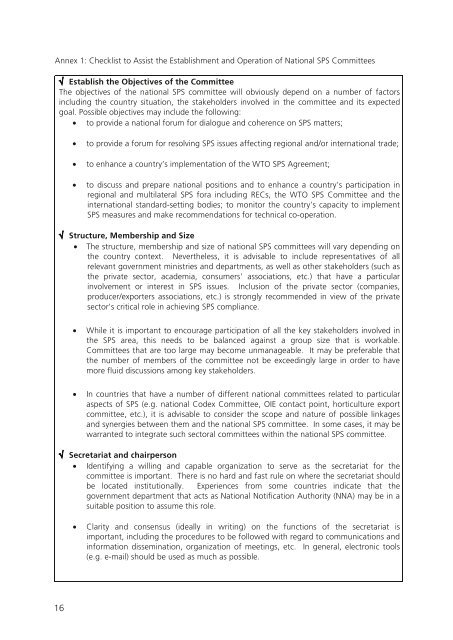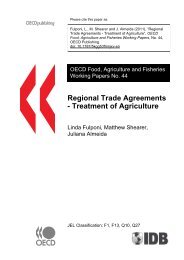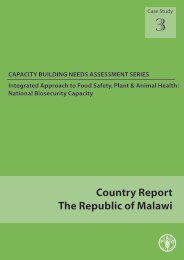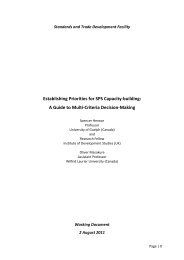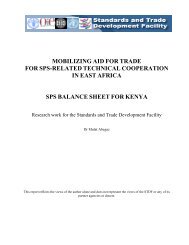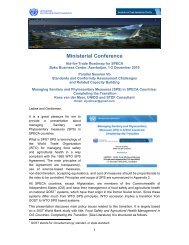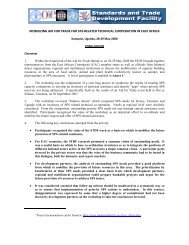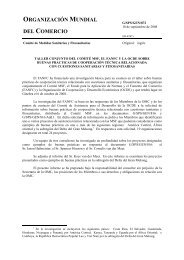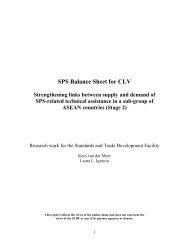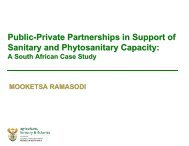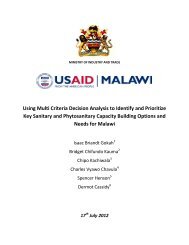National SpS Coordination Mechanisms - Standards and Trade ...
National SpS Coordination Mechanisms - Standards and Trade ...
National SpS Coordination Mechanisms - Standards and Trade ...
Create successful ePaper yourself
Turn your PDF publications into a flip-book with our unique Google optimized e-Paper software.
Annex 1: Checklist to Assist the Establishment <strong>and</strong> Operation of <strong>National</strong> SPS Committees√ Establish the Objectives of the CommitteeThe objectives of the national SPS committee will obviously depend on a number of factorsincluding the country situation, the stakeholders involved in the committee <strong>and</strong> its expectedgoal. Possible objectives may include the following:• to provide a national forum for dialogue <strong>and</strong> coherence on SPS matters;• to provide a forum for resolving SPS issues affecting regional <strong>and</strong>/or international trade;• to enhance a country’s implementation of the WTO SPS Agreement;• to discuss <strong>and</strong> prepare national positions <strong>and</strong> to enhance a country’s participation inregional <strong>and</strong> multilateral SPS fora including RECs, the WTO SPS Committee <strong>and</strong> theinternational st<strong>and</strong>ard-setting bodies; to monitor the country’s capacity to implementSPS measures <strong>and</strong> make recommendations for technical co-operation.√ Structure, Membership <strong>and</strong> Size• The structure, membership <strong>and</strong> size of national SPS committees will vary depending onthe country context. Nevertheless, it is advisable to include representatives of allrelevant government ministries <strong>and</strong> departments, as well as other stakeholders (such asthe private sector, academia, consumers' associations, etc.) that have a particularinvolvement or interest in SPS issues. Inclusion of the private sector (companies,producer/exporters associations, etc.) is strongly recommended in view of the privatesector's critical role in achieving SPS compliance.• While it is important to encourage participation of all the key stakeholders involved inthe SPS area, this needs to be balanced against a group size that is workable.Committees that are too large may become unmanageable. It may be preferable thatthe number of members of the committee not be exceedingly large in order to havemore fluid discussions among key stakeholders.• In countries that have a number of different national committees related to particularaspects of SPS (e.g. national Codex Committee, OIE contact point, horticulture exportcommittee, etc.), it is advisable to consider the scope <strong>and</strong> nature of possible linkages<strong>and</strong> synergies between them <strong>and</strong> the national SPS committee. In some cases, it may bewarranted to integrate such sectoral committees within the national SPS committee.√ Secretariat <strong>and</strong> chairperson• Identifying a willing <strong>and</strong> capable organization to serve as the secretariat for thecommittee is important. There is no hard <strong>and</strong> fast rule on where the secretariat shouldbe located institutionally. Experiences from some countries indicate that thegovernment department that acts as <strong>National</strong> Notification Authority (NNA) may be in asuitable position to assume this role.• Clarity <strong>and</strong> consensus (ideally in writing) on the functions of the secretariat isimportant, including the procedures to be followed with regard to communications <strong>and</strong>information dissemination, organization of meetings, etc. In general, electronic tools(e.g. e-mail) should be used as much as possible.16 18


